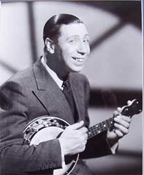
Following on from WorldbyStorm’s great post on the implausibility of the new coalition government in Dublin, I am drawn to reflect on implausible coalitions. Even by Irish standards, the line-up of Fianna Fáil, the Greens, the rump Desocrats, Jackie the Cap of South Kerry, disgraced Fianna Fáiler Bev Flynn, disgraced Blueshirt Michael Lowry and socialist republican Finian McGrath is a doozy.
I have to say, though, that the putative “Alliance for Change” government touted by Electric Enda would have trumped it. Considering Enda’s ruling out of any arrangements with FF or the Provos, and Jackie already having plighted his troth to Bertie, the only line-up possible would have been: Fine Gael, Labour, the Greens, the Desocrats, Lowry, Flynn, McGrath and our old friend Tony Gregory. As implausible configurations go, that one would have had Amanda Brunker beat. But would it have been the least plausible coalition ever seen in Leinster House? No, it would not.
Let us now enter the Tardis and return to the aftermath of the 1948 election. That time around, Fianna Fáil remained easily the largest party, returning with one more seat than all opposition parties put together. However, after sixteen straight years of FF government and the hardships caused by the Economic War and the Emergency, it was not surprising that FF would suffer a dip in popularity, and in the end Dev returned with 68 seats out of 147, six short of a majority with a dozen fairly diverse independents holding the balance of power.
What would have seemed to be the most plausible outcome would have been yet another FF-led government, not least because Fine Gael at that time seemed to be in terminal decline, returning a mere 31 deputies, with its vote bobbing along around the 20% mark and having been wiped out in large swathes of the state – only returning three TDs in the whole of Connacht, for instance. But that doesn’t account for the ingenuity of the Irish TD sniffing a chance at power, and thus the wondrous First Inter-Party Government was born.
Let’s consider the forces involved in this government. You had Fine Gael, the Free State party, the Commonwealth party, the bolthole for dispossessed Unionists and Redmondites. It was the party of Oriel House and the 77 executions, the party that ran the Saorstát with an iron fist for ten years, the party of then barely reconstructed Blueshirtism. It was, by any standard, an extremely conservative party, representing in the main the interests of the South Dublin upper bourgeoisie and the big ranchers.
You had Clann na Poblachta, a party made up largely, though not exclusively, of former IRA men. These were guys who had spent ten years opposing the 1937 Bunreacht, who had tried in 1939 to launch a war against England, and who during the Emergency had dissented from the almost unanimous support for neutrality in trying to line up Ireland with the Axis. Having been ferociously repressed by Fianna Fáil, they then gave that up for a bad job, abruptly became a constitutional party, and began merrily cannibalising the Fianna Fáil electorate. Their programme was militantly republican on the national question and, by the standards of the time, extremely leftwing on social and economic issues – in other words, a souped-up version of Fianna Fáil’s 1926 programme.
You had Clann na Talmhan, who are unfortunately forgotten these days, but were a fascinating formation in their own right. This was a party of impoverished small farmers in the West and its main policy was radical land reform, in line with the Fianna Fáil programme but not with FF’s record in government. The interests of the CnaT base were fundamentally opposed to the big farmers who increasingly dominated FG.
You also had not one but two Labour parties, having split a few years previously and spent the election campaign smearing and slandering each other with wild abandon. If you think the SWP-Militant bunfights on Indymedia are bad, the Labourites of the 1940s make them look like the wusses they really are.
Put all these disparate groups together and you still weren’t close to a majority, so what transpired in 1948 was a coalition of five parties and a technical group of nine – count ’em – nine independents, none of whom agreed on anything except that they wanted to put FF out. These differences were bridged by the simple introduction of the abeyance principle – in other words, everybody forgot about their programmes and concentrated on the division of spoils. And it all went surprisingly smoothly, with the only big stumbling block Clann na Poblachta’s refusal to accept the FG leader, General Mulcahy, as Taoiseach. So FG put forward Costello for the top job, Mulcahy got a seat at cabinet in any case and that was that. And, as we know, this Frankenstein government lasted a whole three years, thus scundering all those smart alecks in Fianna Fáil who expected it to collapse within months.
There is another interesting aspect to 1948, which is that Fine Gael did not dominate the opposition. FG held a mere 31 seats, as against 19 for the two Labour parties, ten for Clann na Poblachta and seven for Clann na Talmhan. There was a distinct possibility of a Labour-Republican bloc, possibly involving the small farmers, supplanting FG as the second force in the state. But that would have required Norton and the other Labour leaders to play a long game, eschewing bums on seats in the short term for the big prize in the long term. We know of course what they chose, and the effect of their choice was to breathe new life into a moribund Fine Gael, and for decades to come condemn Labour to being not a challenger for power in its own right, but a small and docile appendage to FG.
Does any of this sound familiar?





